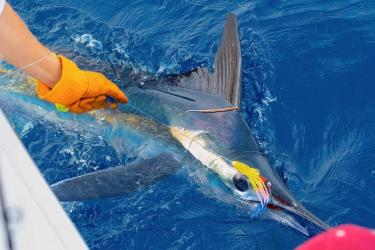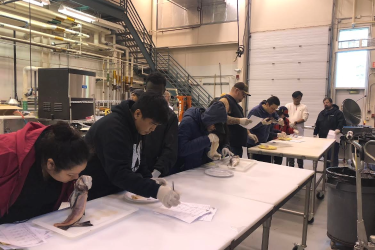Where did you grow up?
I was born on Ramstein Air Base near Kaiserslautern, Germany but spent my youth in Roanoke Rapids, North Carolina.
Where did you go to school and in what subject did you get your degree(s)?
I have a Bachelor’s degree in Biology from East Carolina University and a Master’s degree in Marine Science from East Carolina University. I am currently pursuing a doctoral degree in Engineering and Applied Science from the University of New Orleans.
How did you come to work at the Southeast Fisheries Science Center?
I worked for the North Carolina Division of Marine Fisheries in Morehead City, North Carolina from 1996 to 2003. During that time, I was in charge of a statewide fisheries bycatch research and monitoring program. Sea turtle bycatch became a significant issue for coastal fisheries. This led to collaborations with staff at the Southeast Fisheries Science Center’s Mississippi laboratories on research projects. In 2003, a job opportunity arose in the then named Harvesting and Engineering Branch; I applied and was very happy to be selected.
What do you do at the science center?
Earlier in my career, as a research scientist, my work primarily focused on reducing bycatch in commercial fisheries. This was generally directed at reducing the capture of protected species. I am the Chief of the Harvesting Systems Branch (formerly Gear and Vessel Support Branch), which focuses on:
● Supporting surveys and research through readiness and operation of our small research vessels the R/V Southern Journey and R/V Caretta and construction of sampling gear and support equipment
● Contributing to agency research and development of fishing gear and fisheries-related components that reduce bycatch and bycatch mortality of incidentally captured fish and protected species
● Providing expert consultations on fishing gear and fisheries techniques as they relate to fisheries bycatch for both domestic and international fisheries
What do you like most about your position?
Learning from the extremely talented team of individuals that I work with everyday at the Southeast Fisheries Science Center. The expertise and dedication to our mission is inspiring and motivates me to do my best when representing the important work we do.
What advice would you have for someone interested in a career at NOAA Fisheries?
Focus on producing your best work and establish and maintain personal connections within and outside your field of research. This, combined with seeking opportunities for collaborative work and making the most of those opportunities, will definitely help your chances of joining our talented team.
Is there a book, quote, or person that influenced you to be the person that you are today? Tell us why.
My academic mentor, Dr. Roger Rulifson, probably influenced me most with regard to my approach to research—which also translates to interpersonal relationships. He illustrated the importance of complete objectivity and meticulous awareness of potential biases when approaching a problem. Dr. Rulifson suggested not being discouraged by study outcomes you did not expect, but to learn from those experiences and use them to ask and answer more questions. And most importantly, he encouraged his students to stand up for what they believe in and communicate their perspective.
What do you like to do outside of work?
Outside of work, I like to spend quality time with my children (Theodora 3, Audrey 7, and Sammy 17) away from the ocean. I enjoy outdoor activities: biking, fishing, and hunting either whitetail deer or wild turkey. I am an avid gardener and love to grow summer vegetables and herbs.







